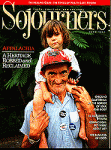Birmingham, Alabama, is digging out from the Great Blizzard of '93. The snow, above my knees for two days, has nearly disappeared. Traffic has begun to move noisily on the freeway near our house; trains again roar up and down the tracks across the street. By spring, when you read this, the blizzard will be a good story to tell sometimes among friends. Now it's a bit more immediate.
I took the four snowed-in days as involuntary retreat, isolated by the heavy white drifts covering roads and sidewalks. My neighbor brought me chili and I gave her toilet paper; we checked on friends by phone. Once the power came on I spent hours listening to old records and knitting a sweater for my little nephew. Like most retreats, this one provided time and silence for intense reflection: The interior substance was other than the quiet exterior structure.
I still live with the Gulf war. Whenever there's silent time, I realize that. Desert Slaughter is a current reality. The time since the "end" of the war has been one of deep doubt, even of despair, of testing and temptation. God knows the war was horrible enough; the ongoing unnoticed suffering is horrible still. The duplicity of the U.S. government, the gullibility of the public, the neat sidestepping of our best efforts at unified organizing, our own breakdowns under pressure--these are all elements of the war and its aftermath, all cause for concern.
What I've been struggling with is a deeper question, a question of soul, I think. It's not strategy or tactics or politics or even morality. It's more a question of essence, of meaning, of faith and faithfulness. I'm sure it's partly that I'm approaching 50 and looking over my life; it's partly learning a new city, a new community, new work. But primarily it comes from the sense of encounter with an autonomous and individual force, out of sight but very real, during those days leading up to the military attack on Iraq.
The clearest sense I had of such a force came while I was in Iraq with a Fellowship of Reconciliation-sponsored peace delegation in December 1990. It was a difficult group with a difficult task. We had plenty of internal conflict and confusion. What I kept feeling, though, was that we were on the surface of something that we didn't understand. Below us were depths and creatures we'd never imagined, and they acted around, through, in spite of us. We were quite literally out of our depth.
We acted with all good intention to build bridges between people, to ask for freedom for detainees, to listen and perhaps to influence political structures. Those were all good objectives; but they were surface ones. Somehow they didn't take into account the autonomous nature of the struggles--a kind of spirit of the conflict that seemed to be in both sides and that made obvious solutions (like negotiations) impossible. Every once in a while there was the sense of being touched by something as it passed by; of almost catching something out of the corner of an eye, of just seeing the ripple left by its passing.
Now, wrapped in an afghan and gazing out plastic-covered windows at sun on snow, I find that Paul's terminology fits: I think we encountered powers and principalities, and in a deep spiritual sense we were not prepared.
OVER THE YEARS since I became involved in working for change, I learned about external systemic evil, and about how it gets internalized. I learned about the interplay between inner and outer, how systems are made of compliant individuals; how people can change; how systems can change. I learned that things are always more complicated than I know, and that my attempts at understanding never really make it.
In the process I became deeply convinced that following Jesus is a matter of practice. I could commit myself to a series of experiments with Jesus' teachings, to people and relationships that would help me discern and act. The practice has often been hard and painful, but it also brought joy. There has never been a time when I felt that I should be doing something else.
But these last few years have had a different quality, a qLuality of struggle that has cut to the bone. My mind and will have known that nothing has changed, but my heart and soul have cringed and wanted to run away from those guessed-at adversaries. It has been like holding on with skinless hands: The holding on may have hurt more than letting go. However hard I knew it would be, I know it will be harder; however deep I knew the struggle would be, I know it will be deeper and more serious. There's something about struggling with these powers that's more terrifying than any visible human or systemic evil.
And there aren't any new answers. To love one another, to build bridges and community, to be faithful in relationship, to try to be humble, to try to offer one's life: Those are still the answers, but they're more frightening and more demanding than they were before. It has taken a long time for my heart to catch up with my will, for me to be more or less in one place again, to be able to say "fiat," whatever that turns out to mean.
I've been the woman on the outskirts of the crowd, forcing myself to stay in one place until the healing gift of coherence is given again. I know now that for me the gift means recommitment to those answers I already know, and with it recommitment to relationships, to community, to the practice already adopted.
Shelley Douglas was a Sojourners contributing editor and was involved with nonviolent organizing in Birmingham, Alabama when this article appeared.

Got something to say about what you're reading? We value your feedback!
